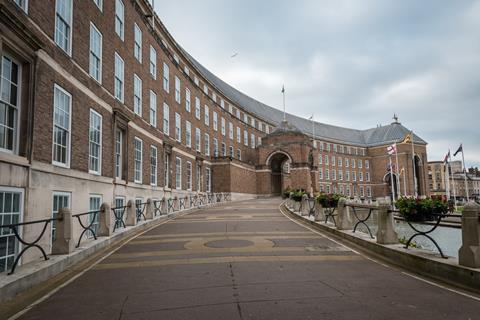Over a year, 216 homes could be made available as temporary accommodation
Bristol City Council has put forward a plan to convert 18 council homes each month into temporary accommodation to house people facing homelessness.

On Tuesday, the local authority launched a consultation on the proposal, noting that with the increase in households needing temporary accommodation and rising costs, “we need to find new ways to provide more temporary accommodation that is more affordable.”
On 31 March this year, the latest government data shows that in Bristol, 1,541 households were living in temporary accommodation. This is an increase from the 1,242 households in temporary accommodation at the same time last year.
The council’s plan involves converting up to 18 ‘general needs’ homes per month into temporary accommodation to help provide housing for people in urgent need while their needs are assessed and they wait for a more permanent home.
>> See also: Waltham Forest Council green lights JV with Mears to buy 400 homes for use as temporary accommodation
>> See also: South London council bucks trend and reduces temporary accommodation use
Bristol City Council plans to run the initiative for two years, with a review after the first year, which could make up to 432 additional homes available for use as TA over that period.
The council said it will not use new-build homes for temporary accommodation, and that all new-build homes will be available for general needs lettings.
’General needs’ council homes are for people who are on HomeChoice Bristol housing register, who are either already housed or on the waiting list, and waiting to move to a more suitable property.
Currently, around 21,600 households are on the HomeChoice Bristol register, waiting to be allocated home.
The council has around 27,000 social housing properties in total and stated “we are working hard to increase this, but the number of people who need social housing is also going up”.
In a statement on the consultation, the council said it is “committed to providing safe, secure and suitable temporary accommodation for those who need it.”
It added that “the amount the council can receive from national government to cover the cost of temporary accommodation has been frozen since 2011, meaning there is a growing funding shortfall the council needs to meet.
“As a council we need to find new ways to provide more temporary accommodation that is more affordable.”
The consultation will close on 1 October.
They introduced this initiative after the borough’s temporary accommodation costs increased by 35% in less than two years due to B&B usage.
Once the properties are acquired through the JV, they will be offered to households in temporary accommodation in Waltham Forest, providing them with a permanent place to live.










No comments yet